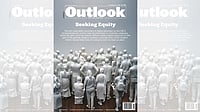From patriarchal notions around marriage to transgender issues, companies have often addressed social and gender issues in their advertisements.
Many of these ads, however, have been picked by conservatives over the years who bashed companies and brands for progressive messaging.
These ads have been labelled as "anti-Hindu" and "woke" and have been termed as being against Indian culture.
The latest instance of such conservative backlash is an ad by Starbucks featuring a transgender woman. The ad has been termed by some on Twitter as "woke" and "demonic" and something that will destroy Indian culture. Such people are also running #BoycottStarbucks hashtag on Twitter.
Calls for Starbucks' boycott over ad on transwoman
After the Indian arm of international coffeehouse chain Starbucks posted an ad featuring a transwoman, a section of Twitter users started running #BoycottStarbucks hashtag on Twitter.
The ad features a transwoman named Arpita meeting her parents at a Starbucks coffeehouse. The father, who appears to initially have issues in accepting her transition, goes to the counter to place the order. Later, the Starbucks staffer announces "three cold coffees for Arpita" and this brings tears to Arpita's eyes as she realises that her father has finally accepted her.
The message of acceptance of a trans child by her parents has been taken by some as against Hindu values.
A user going by the name STAR Boy, with a blue tick that's up for sale at Elon Musk's Twitter, called the ad "pathetic". The user has over 83,000 followers, including top officials, Union ministers, journalists, and Indian right-wing personalities.
"Now they [have] started their woke agenda in India...Pathetic Starbucks ad where they are promoting sex-change surgery. Arpit becomes Arpita by sex-change surgery and hindu family celebrates it," said this anonymous user in a series of tweets.
Radharamn Das of International Society for Krishna Consciousness (ISKCON) called Starbucks "proponents of demoniac civilization" in a tweet.
"Proponents of demoniac civilization. #BoycottStarbucks otherwise they will destroy your family and Bharat," tweeted Das, a verified user identifying as Vice President and Spokesperson of ISKCON, a Hindu Vaishnavite movement.
Another user called Starbucks "groomers". Users also pointed that it was a Hindu family in the ad, suggesting the ad intentionally harmed Hindu sentiments. Several tweets were outright abusive.
Ads and social issues
Advertisements have addressed social and gender issues for a long time not just in India but abroad as well.
However, conservative backlash has increased in recent years to ads with progressive messages, particularly on ads addressing gender issues.
A study by two University of Portsmouth reserchers found that ads can actually lead to social and market changes.
The study found that "advertising has a distinct capacity to influence institutional and market transformation on social equality issues".
"Our theorising reveals the recursive nature of advertising, as we uncover dynamic influences on advertising creative decision-making in a market system...As such, our research identifies that the cultural visibility of advertising has served to magnify trailblazing advertising campaigns that have promoted gender justice ideals, to the extent that this has expedited the rate of change in the market system, and therefore, society," says the study by Karen Middleton and Sarah Turnbull.
In India, several ads over the years have broken gender stereotypes, such as the subtle Ford ad in which women were shown to be capable of securing themselves in context of Raksha Bandhan as opposed to the traditional notion of a man securing her. There was also an ad by Titan about women opting to work against the societal expectation of them stopping working to make way for relationships with men.
In her story, Outlook's Rakhi Bose noted that ads are increasingly being dubbed anti-Hindu now.
Bose noted, "Moreover, festival or no festival, ads depicting digressive or progressive feminist stances are often pegged as anti-Hindu. The controversy regarding the latest AU ad, for instance, is reminiscent of a recent Manyawar ad controversy featuring actress Alia Bhatt. The ad, which depicted Bhatt as a bride at her own wedding, delivered a commentary on the custom of 'Kanya Daan' which did not go down well with some sections of Hindus."
"The incidents show how religious cancel culture has become a go-to for Indian social media trolls who jump at the slightest sign of reformative discourse of any kind and often shield their deeply problematic views on gender, caste, class, and religion through tirades against alleged “anti-Hindu” campaigns and content."
Bose also listed several instances of ads being branded anti-Hindu:
- Fab India's ad on "Jashn-e-Riwaz" collection around the time of Diwali
- Tanishq ad on cracker-free Diwali
- Dabur ad on same-sex couple celebrating karva chauth
- Surf Excel ad on children celebrating Holi
- Red Lable's Ganesh Chaturthi ad depicting a Hindu man buying a Ganesh idol from a Muslim
In her article, Lachmi Deb Roy noted that ads have longed sparked off conservative backlash in India. She cited the example of a Cadilla ad featuring Bipasha Basu and Dino Morea in 1990s that led to the brand leaving India.
While previously it was more about social conservatism, as depicted in the Cadilla episode, now it's about Hindu sentiments being hurt.
"The country’s right-wing, more assertive now, believes that a section of people derive pleasure in denigrating Hindus and Hinduism. In 2020, Tata group’s jewellery brand Tanishq was forced to take down an ad showing a Muslim family throwing a baby shower for their Hindu daughter-in-law," noted Roy, also citing examples of other brands facing Hindu Right's ire like Surf Excel and Manyavar.


























